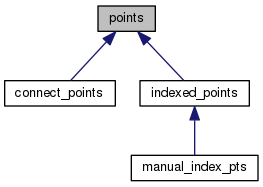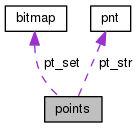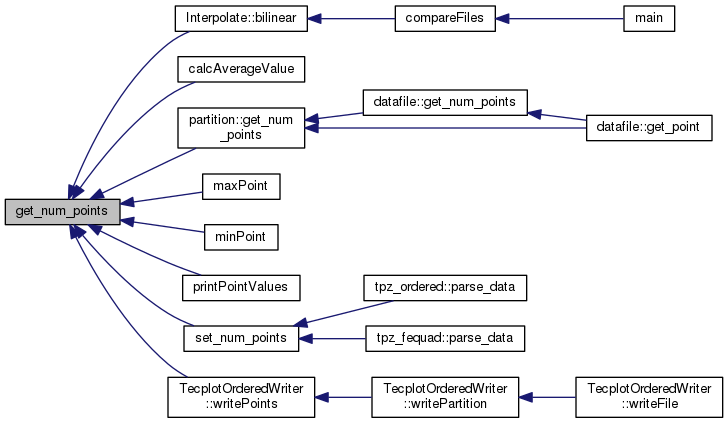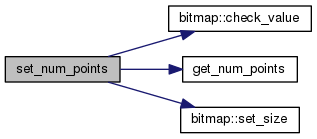#include <points.h>


Public Member Functions | |
| points () | |
| points (int num_points) | |
| points (const points &p) | |
| points & | operator= (const points &p) |
| virtual | ~points () |
| virtual points * | clone () |
| void | set_num_points (int n) |
| void | set_num_vars (int n) |
| void | set_num_indep_vars (int indep_vars) |
| int | get_num_points () |
| int | get_num_vars () |
| int | get_num_indep_vars () |
| void | set_point_val (int point_number, int var, long double val) |
| void | clear_dep_vars (int point_number) |
| pnt | get_point (int n) |
| virtual int | get_closest (long double *coord) |
| virtual std::vector< int > | get_connected_points (int point_num) |
| virtual void | sort () |
| long double | largest_val (int dim) |
| long double | smallest_val (int dim) |
Static Public Member Functions | |
| static void | delete_all (std::vector< points * > points_vector) |
| static bool | contains_null (std::vector< points * > points_vector) |
Protected Attributes | |
| int | num_points |
| int | num_vars |
| int | num_indep_vars |
| pnt ** | pt_str |
| bitmap | pt_set |
| points | ( | ) |
Definition at line 7 of file points.cpp.
References num_indep_vars, num_points, num_vars, and pt_str.
Referenced by clone().

| points | ( | int | num_points | ) |
Definition at line 30 of file points.cpp.
References bitmap::check_value(), i, num_indep_vars, num_points, num_vars, pt_set, and pt_str.

|
virtual |
Definition at line 15 of file points.cpp.
References bitmap::check_value(), i, num_points, pt_set, and pt_str.

| void clear_dep_vars | ( | int | point_number | ) |
|
virtual |
Reimplemented in manual_index_pts, indexed_points, and connect_points.
Definition at line 80 of file points.cpp.
References points().
Referenced by Interpolate::bilinear().


|
static |
Definition at line 237 of file points.cpp.
Referenced by compareFiles().

|
static |
Definition at line 227 of file points.cpp.
Referenced by compareFiles().

|
virtual |
Reimplemented in indexed_points, and connect_points.
Definition at line 192 of file points.cpp.
Referenced by Interpolate::bilinear().

|
virtual |
Reimplemented in indexed_points, and connect_points.
Definition at line 196 of file points.cpp.
Referenced by Interpolate::getCell().

| int get_num_indep_vars | ( | ) |
Definition at line 125 of file points.cpp.
References num_indep_vars.
Referenced by TecplotOrderedWriter::addOrderedPartition(), Interpolate::bilinear(), and TecplotOrderedWriter::writePoints().

| int get_num_points | ( | ) |
Definition at line 117 of file points.cpp.
References num_points.
Referenced by Interpolate::bilinear(), calcAverageValue(), partition::get_num_points(), maxPoint(), minPoint(), printPointValues(), set_num_points(), and TecplotOrderedWriter::writePoints().

| int get_num_vars | ( | ) |
Definition at line 121 of file points.cpp.
References num_vars.
Referenced by TecplotOrderedWriter::addOrderedPartition(), Interpolate::bilinear(), and TecplotOrderedWriter::writePoints().

| pnt get_point | ( | int | n | ) |
Definition at line 183 of file points.cpp.
References bitmap::check_value(), pt_set, and pt_str.
Referenced by Interpolate::bilinear(), calcAverageValue(), partition::get_point(), Interpolate::getCell(), maxPoint(), minPoint(), printPointValues(), Interpolate::sortPoints(), and TecplotOrderedWriter::writePoints().


| long double largest_val | ( | int | dim | ) |
Definition at line 51 of file points.cpp.
References bitmap::check_value(), i, num_indep_vars, num_points, num_vars, pt_set, and pt_str.
Referenced by connect_points::operator=(), and indexed_points::operator=().


| void set_num_indep_vars | ( | int | indep_vars | ) |
Definition at line 113 of file points.cpp.
References num_indep_vars.
Referenced by tpz_ordered::parse_data(), and tpz_fequad::parse_data().

| void set_num_points | ( | int | n | ) |
Definition at line 84 of file points.cpp.
References bitmap::check_value(), get_num_points(), i, n, num_points, pt_set, pt_str, and bitmap::set_size().
Referenced by tpz_ordered::parse_data(), and tpz_fequad::parse_data().


| void set_num_vars | ( | int | n | ) |
Definition at line 109 of file points.cpp.
Referenced by tpz_ordered::parse_data(), and tpz_fequad::parse_data().

| void set_point_val | ( | int | point_number, |
| int | var, | ||
| long double | val | ||
| ) |
Definition at line 129 of file points.cpp.
References bitmap::check_value(), num_points, num_vars, pt_set, pt_str, bitmap::set_value(), pnt::size, and pnt::vals.
Referenced by Interpolate::bilinear(), tpz_ordered::parse_data(), and tpz_fequad::parse_data().


| long double smallest_val | ( | int | dim | ) |
|
virtual |
Reimplemented in indexed_points, and connect_points.
Definition at line 201 of file points.cpp.
|
protected |
Definition at line 82 of file points.h.
Referenced by clear_dep_vars(), connect_points::get_closest(), indexed_points::get_closest(), get_num_indep_vars(), operator=(), points(), and set_num_indep_vars().
|
protected |
Definition at line 80 of file points.h.
Referenced by connect_points::connect_points(), connect_points::get_closest(), indexed_points::get_closest(), get_num_points(), largest_val(), operator=(), connect_points::operator=(), points(), connect_points::set_connectivity(), set_num_points(), set_point_val(), smallest_val(), and ~points().
|
protected |
Definition at line 81 of file points.h.
Referenced by get_num_vars(), operator=(), points(), set_num_vars(), and set_point_val().
|
protected |
Definition at line 89 of file points.h.
Referenced by get_point(), operator=(), points(), set_num_points(), set_point_val(), and ~points().
|
protected |
Definition at line 85 of file points.h.
Referenced by clear_dep_vars(), connect_points::get_closest(), indexed_points::get_closest(), indexed_points::get_indexed_point(), get_point(), largest_val(), operator=(), points(), set_num_points(), set_point_val(), smallest_val(), and ~points().